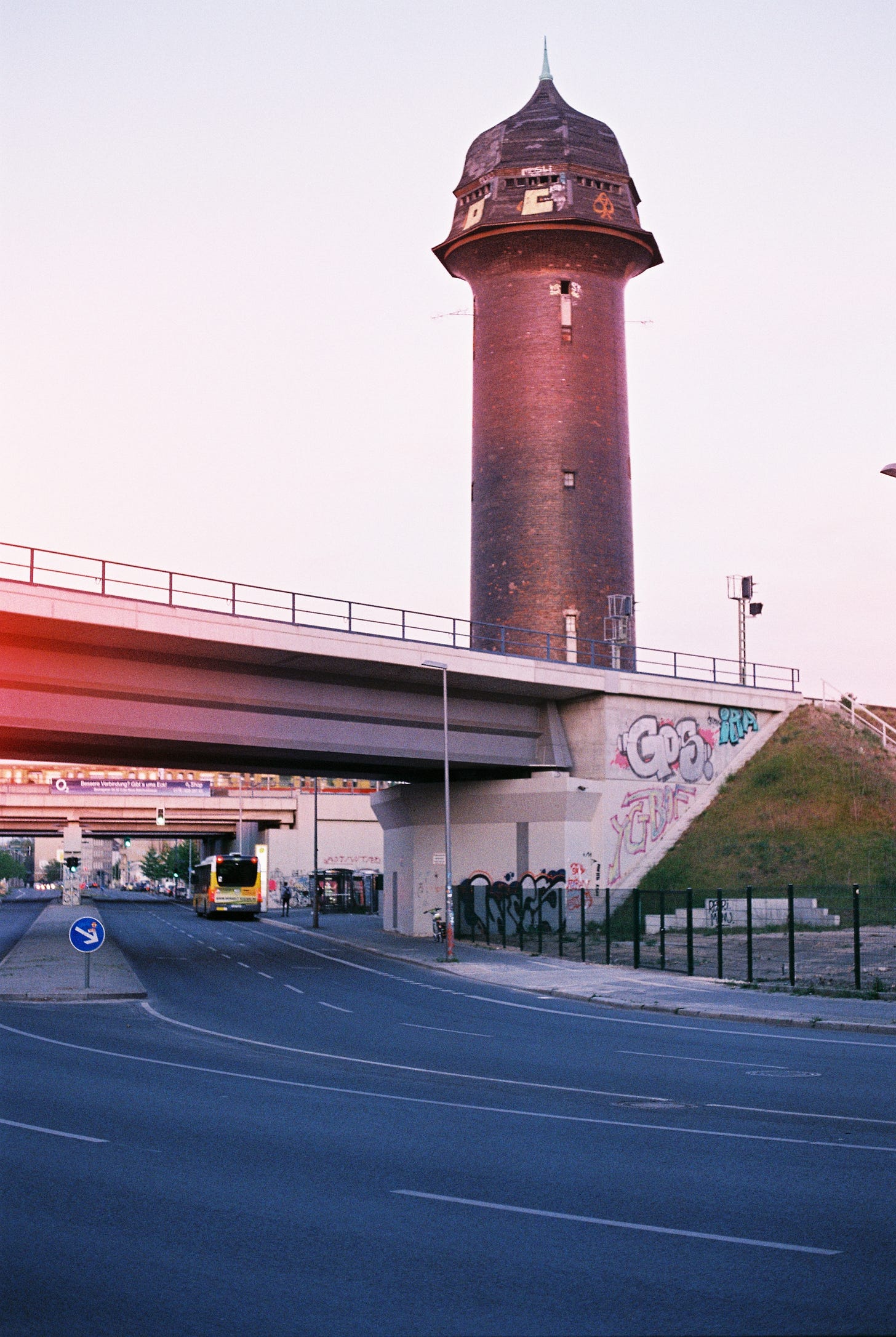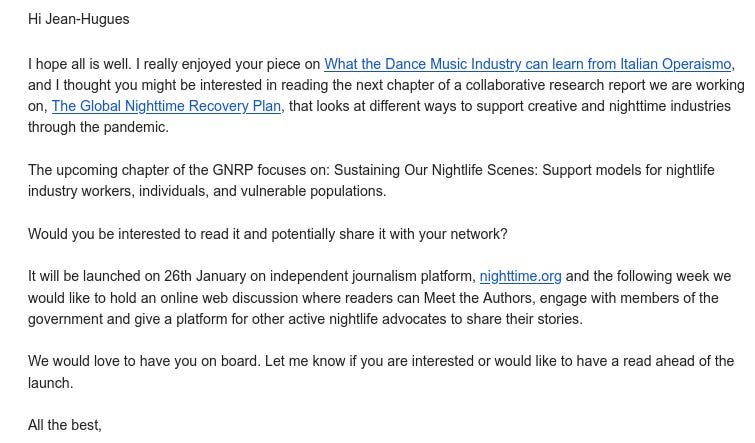How Berlin's Clubcommission's actions to save the nightlife are the opposite of relief
This a third public call out after the second one published on 09/02/2021 via notions.so In a form of an essay this time. Co-written with Hanna Keil (pronouns : She/They)

This a third public call out after the latest one published on 09/02/2021
In a form of an essay this time.
Since March 2020, nightlife spaces across the world have essentially been shuttered. Workers in this sector were already facing financial hardship in a tough and traditionally unfair industry, but pandemic restrictions have increased the pressure.
The German capital Berlin is central to Europe's nightlife industry, and has experienced over a decade of rapid gentrification. This ugly process has been accelerated in the face of COVID-19 restrictions. Spaces that were welcoming to people on society's margins and organizations unwilling to participate in the capitalist rat race1 have been hit the hardest; after months of quarantine, they are disappearing one after another and after a failing Berlin’s constitutional court ruling against the rent cap many will be facing back payments. 2
This comment about US stimulus check fit well with the BCC politics in Berlin right now.
Berlin Clubcommission as the self-proclaimed nightlife lobby and their numerous affiliates have been chosen to deal with these changes. But while they should be tackling an evolving real estate problem that has been closing down clubs for years, they are instead protecting landlords' interests.
A special grant funded by public donations to "save the nightlife" (United We Stream) has been offered on top of government support for clubs to pay 120% of rent, meaning that amenities are included. In other words, this covers the payment of heating and electricity even while clubs are closed.
According to a statement issued by the federal government, the COVID-19 pandemic officially impacts the rental agreement between a business and its landlord. The law states that landlords and businesses share the impact of lockdown restrictions, and therefore building owners can reduce the rent.3
In the face of these changes, why is the Berlin Clubcommission not offering help for their members to negotiate with landlords to reduce the rent, access government support, and redistribute this money to communities in need?
"It's true that the vast majority of the support - both crowdfunding and government support - is used to pay the clubs' rent," says Awareness Academy head Katharin Ahrend. "The numbers presented in the press do not show the full picture and are biased by venues that received disproportionally large amounts, when at the same time many venues struggled to get government funding at all. Some venues that received government help had to hand off all of it to their respective landlords."
This reveals just how Berlin Clubcommission's complicity in landlordism4 further drives the gentrification of venues, only securing clubs that are already established. The irony here is that many clubs share the same landlords, so you wouldn’t have to knock on a lot of doors to begin negotiations. In Jannowitz Brücke, Swedish electricity provider Vattenfall is the predominant landlord; the buildings around Alt-Treptow meanwhile are controlled by the state-owned Deutsche Bahn and rented out to clubs.
Surprisingly, there is no coverage of these real estate issues on Berlin Clubcommission's website5. It feels like an unusual omission when we consider that Kit Kat Club, a space located directly below the Berlin Clubcommission office, has been threatened with a rent increase that would mean eviction. More recently, popular venue Griessmühle was forced to close when the landlord decided to replace it with a coworking space.
When the Berlin government aided the shutdown of an entire district to expel residents from long-running queer anarchist squat Liebig 34 last year, their support of gentrification was made crystal clear. The formerly occupied house in Friedrichshain is owned by Gijora Padovicz, one of the investors behind the Rummels Bay project6 that evicted a homeless camp in Lichtenberg just weeks ago.
Each week spaces close in the Friedrichshain area, where there are dozens of clubs. So how can an organization that advocates for nightlife completely ignore this? To fight the epidemic of club closures, Berlin Clubcommission has attempted to market club culture as a business to the country's politicians7, who seem to only understand this neoliberal approach.
This strategy is inherently dangerous, following the mechanisms of capitalism and excluding the same marginalized people who are the reason for club culture to exist in the first place. 8 In positioning club culture as a business in a neoliberal marketplace, it must be optimized for profit to compete with commercial business models. This is a fight that's doomed from the beginning and one that has already taken its toll on nightlife.
Every year entrance fees increase, drinks get more expensive and programming shifts to entice the growing set of Easyjet tourists. The only survivors will be clubs that provide what Berlin Clubcommission spokesman Lutz Leichsenring calls "Alleinstellungsmerkmale" (a unique selling point), clubs such as Watergate, Tresor or Berghain. Businesses who seemingly don’t need any help to optimize for profit9 and clearly see no interest in protecting the community and selling themselves out to fashion brands whilst taking irresponsible risks in the middle of the highest COVID infection rate in Berlin.10
Leichsenring is the co-chair of VibeLab (along with Mirik Milan), a major player in European nightlife that oversaw the transformation of Amsterdam's Rembrandt Plein. Milan was the city's "night mayor", a concept that's central to VibeLab's nightlife strategy. The Amsterdam project lasted three years and promised to make the area more accessible to pedestrians while offering a website to take residential complaints. A few years later, it's clear that the project has contributed to the gentrification of central Amsterdam. We don’t need any more strategies accelerating gentrification in Berlin.11
The elephant in the room is that Berlin is a white supremacist’s wet dream, where the social contract is be white and speak broken german and you are good to go. This is the result of decades of German policy that has attempted to reckon with its Nazi past with empty virtue signaling, ignoring its Nazi present. Fascism continued to rise in West Germany's government, after the war, law enforcement and intelligence12, but remains mostly unchecked till this day.13
This issue isn't isolated and impacts the wider German cultural climate. When the cold war ended and the Berlin Wall fell in 1989, the soundtrack to Germany's reunification was techno. But techno, a highly political Black art form developed in Detroit, was quickly distanced from its roots and stripped of its Blackness. For a brief time during the rave era, the name was even modified from techno to tekkno, further removing it from its crucial context. This distance had consequences, and as the fall of the Iron Curtain unified Western whiteness, thirsty British DJs joined the party, accelerating techno's dilution.14
Berlin's contemporary club scene rose from these ashes, so its separation from ideological whiteness is almost impossible. When Jan Kähler and Benedict Bogenberger (aka DJ duo Peak & Swift) felt entitled to call a colleague racial slurs between April 2017 and November 2019, they knew their behavior wouldn't be checked. German society's broad racism isn't an abstract concept, it has consequences for visible minorities who are constantly othered by a country with a violent culture of white supremacy.
Since the Afro-German movement was born in the 1980s, assisted by American writer and activist Audre Lorde, progress has ground to a halt. Germany is a country where you can still see entertainers doing blackface in 202115. In Berlin's largely Turkish Neukölln neighborhood last summer, Neo-Nazis terrorized residents with violence and vandalism. This is the context in which Berlin Clubcommission operates, so there is no expectation that they can resolve the club scene's racism single-handedly. But corporate anti-racist work like diversity workshops are useless when it takes months to action any kind of accountability from clubs. 16
Efforts to sustain club culture are severely limited by the corporate imagination. To engage in a comfortable conversation about nightlife funding and grants with politicians in power, the politicians must be placated with ideas that can be seen as competitive in the neoliberal marketplace. This means competing with lucrative commercial projects like malls (Friedrichshain's East Side Mall), stadiums (Mercedes Benz Arena and Platz) and massive tech industry projects like the proposed Tesla headquarters and Amazon's new European base.
Reading the funding report of Musicboard Berlin, the committee that decides how the government's cultural grants are distributed, it shows that this neoliberal positioning pays off. Berlin Clubcommission received a large handout from 2019's budget.17 €175,000 in total, to be split between consulting for clubs (€50,000) and club culture projects (€125,000).
When asked about the initiatives that will be covered with these grants, the Clubcommission presented workshops such as the Awareness Academy, an "Awareness & Diversity working group", Diversity Friendly Nightlife, and Round Tables. Sadly, this is little more than performative action: instead of doing the hard work necessary, Berlin Clubcommission has asked unpaid individuals to reach out to queer and BIPOC collectives, to assist in what is effectively pinkwashing.
Online panels discussing diversity and the intersections of discrimination are useful leverage for flashy PR campaigns, but codes of conduct and accountability structures in venues and the wider industry are still missing. Individuals working in nightlife have reached out to Musicboard Berlin searching for comparable projects to improve nightlife safety, but Berlin Clubcommission has a stranglehold on public funding.
As I stated in my Dweller article which was quoted in our recent call-out with Hansi:
“What are the direct actions taken for employees facing racial discrimination in their work place and attendees facing discriminatory door policies that’s basically a berlin tradition — like wouldn’t it be great, for once, to have an official statement on this matter?”
After reaching out publicly to United We Stream and the Clubcommission I was answered by its president (via email) “I currently see no need to make a statement about our activities.” He added that “A lot of work at Clubcommission is based on a volunteer and project basis with our capacities. It is not easy to always get our work fully visible to the outside world”.
On this I can relate since most of my work is based on volunteer work as well, I don't personally expect or ask them to publicly communicate about every campaign they do, it wasn’t the object of my public statement made in my post on Dweller or the public position that I take on my social. What was the object of calling for public accountability, is that actors of the scene including people who chip in to all the fundraisers “to save the club scene” or the taxpayers who participate in some of the government funding deserve to know how their money is spent.
But as its president stated, “I currently see no need to make a statement about our activities.” I tend to disagree, there is a need to make a public statement about the Berlin clubcomission’s activities.
Speaking of volunteer work, I’ve got asked for free labour from Vibe Lab after writing a piece on having artists paid more fairly - asked to read a chapter of their “Global Nighttime Recovery Plan’’ and/or to join an online meeting on that matter. I would think that the 2777 words of the article “What the Dance Music Industry Can Learn From Italian Operaismo?” voice my opinion as an artist enough, if they were serious and not trying to clout chase/virtue signal they would just implement the ideas in their “Global Nighttime recovery” plan.

So what does Clubcommission do for marginalized and non-institutional collectives in times of crisis who can't access governmental support? In October 2020, Tag der Clubkulture was held, a "showcase festival" that provided events and funding for up to 40 clubs. Recipients of the funding were Berlin's most successful clubs and promoters, and to be eligible they had to agree to host an event in the middle of a growing pandemic. Berlin went into another mandatory lockdown shortly afterward. This kind of action does not support communities in need and is not the level of mutual aid we require in a crisis.
The Clubcommission's government grant for consultancy should be used to ease challenges that clubs are facing in the pandemic. Funds raised by the "save the nightlife" drive meanwhile should be allocated to individuals at risk, not club owners or those who already have a safety net. The money certainly shouldn't be lining the pockets of landlords.
Akifa Taxim is part of the Zucker Club18, one of United We Stream's streaming partners. He confirmed that the goal of the "save the nightlife" fundraiser was not to aid the community, but a promotional effort and marketing strategy. To host the stream, Zucker Club was asked to pay €3000 in web hosting fees. United We Stream's Awareness Manifesto19 looks flashy and contains plenty of buzzwords, but the streams provided did not live up to these promises. A marketing collaboration with German store Rossman20 was never mentioned to Taxim, but a message was relayed that the collaboration wasn’t aligned with Club Zucker's values.
The question arises: where did the money donated by Rossmann actually go? It's hidden inside a complex transparency report21 that United We Stream built throughout the year, but these structures make it difficult to follow the money. To qualify as a streaming partner, Club Zucker was forced to found their own legal entity (e.V.) so that the money for production could be paid by Worx e.V., another organization used by Clubcommission to shuttle funds from brands such as Jägermeister.
We must organize to distance ourselves from Berlin Clubcommission's ideological and strategic failures, and direct our efforts accordingly. We must fight evictions by speaking up against landlordism22 and the neoliberal politics that are driving closures. Even on a day when the German constitutional court23 is ruling against a rent cap in Berlin the Clubcomission is campaigning for open air parties.24 In addition to this, we need a redistribution of funds to the collectives that actually possess the knowledge and skills to make nightlife safer for everyone. Clubs could help inform this change easily; any venue that received a grant from Clubcommission and is not facing eviction could consider redistributing this money to organizations working alongside those most at risk. Right now, anything helps, and the time to start is now.
https://www.dw.com/en/berlin-police-clear-anarchist-occupied-house-liebig-34/a-55211590
https://www.thelocal.de/20210415/berlins-mietendeckel-rent-freeze-ruled-unlawful-what-does-it-mean-for-tenants/
https://www.gesetze-im-internet.de/bgbeg/art_240__7.html; https://www.gesetze-im-internet.de/bgb/__313.html
https://padowatch.noblogs.org/
https://www.clubcommission.de/category/politik/
https://www.leftvoice.org/berlins-social-democratic-government-evicts-residents-of-the-citys-largest-homeless-camp
https://www.morgenpost.de/wirtschaft/article216427741/Berliner-Club-Szene-erwirtschaftet-1-5-Milliarden-Euro.html
https://ra.co/features/1927
https://www.magazine.artconnect.com/editorial/a-closer-look-at-artist-fee-standards-studio-berlin-at-berghain
https://www.theguardian.com/world/2021/apr/12/berlin-police-investigate-possible-breach-of-covid-rules-at-soho-house-party
https://vancouversun.com/news/local-news/amsterdams-night-mayor-aims-to-improve-vancouver-nightlife
https://en.wikipedia.org/wiki/Reinhard_Gehlen
“Neo-Nazi Death Threats And Police Failures In Berlin / Germany” (TW: police violence, right wing violence): https://youtu.be/4DP8OZgFro4
https://dwellerforever.blog/2021/01/26/techno-is-black-tekkno-is-german/
(CW : Black Face)
https://mixmag.net/read/wilde-renate-club-racism-berlin-news
https://www.musicboard-berlin.de/wp-content/uploads/2019/12/PM_1_Foerderrunde_2020_D-1.pdf
http://zucker-club.de/
https://unitedwestream.org/awareness-manifesto/
https://www.facebook.com/watch/?v=2421709847929901
https://unitedwestream.berlin/fundraiser/#content
https://www.dwenteignen.de/
https://www.dw.com/en/berlin-rent-cap-overturned-by-germanys-top-court/a-57209268







